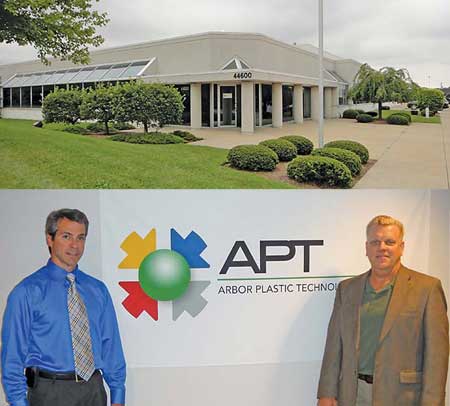A new wave of super-projects in the plastics and chemicals manufacturing sector is ushering in an era of innovative entrepreneurs seeking to make their own fortunes.
All they need is the right climate for growth, says Daryl Patrishkoff, an investor in Arbor Plastic Technologies in Sterling Heights, Mich.
APT, founded in November 2007, recently moved its headquarters and development lab to Sterling Heights from Ohio.
“There were multiple reasons for the move to Michigan, but a major driving force was the Pre-Seed Capital Fund investment of US$250,000 from the Michigan Economic Development Corp., Macomb Oakland County Incubators and Ann Arbor Spark organizations,” Patrishkoff says. “This maximum amount investment award was a real vote of confidence in APT’s products, management team and business plan after a comprehensive, rigorous review.”
APT’s breakthrough product is a non-halogenated fire retardant. “Halogen is not very good for our environment,” says Patrishkoff. “By January 2013, the federal law states that these products must go away. The team at APT was successful in coming up with a proprietary solution that does not use halogen.”
The next step for APT is establishing a manufacturing plant. “We don’t have to build the plant in Sterling Heights,” notes Patrishkoff. “We will pick the plant site that is best for us. We are planning it right now.”
Michigan, while taking a pounding in the national media for its high unemployment rate, is actually doing a lot of the things necessary to win business back, says the APT investor.
“Michigan has decided to do something about work-force development, and I see Michigan becoming more business friendly,” he says. “I am really happy that they are doing away with double taxation.”
Patrishkoff notes that Michigan “has started the legislative process to remove or reduce the personal property tax assessed when companies put in equipment into the plant. If APT gets tax abatements, or the state of Michigan makes these changes to the current environment, it would make our decision much easier to stay with manufacturing in Michigan.”
Currently, the firm is contract manufacturing its products at select suppliers to fill orders. “As new sales are awarded and revenue growth is generated, APT will invest in its own internal manufacturing operations,” says Patrishkoff. “APT expects to be at that decision point in late 2011 and has begun the internal manufacturing investment program plan. Over the next few years, APT expects to create 60 new hires and invest up to $5 million in its manufacturing operations.”
The decision on where to locate the APT factory will be based on the following key factors, says Patrishkoff:
- The area’s long-term business environment, which includes business tax rates, property tax rates, investment tax impacts and governmental regulations.
- The immediate need for workers in the areas of laboratory, quality, operations, program management and plant floor personnel.
- Continual work-force development of certified skills in specific tools, techniques and methodologies to meet customer demands for each industry served.
- Proximity to multi-industry strategic customers for future growth.
- Proximity to global supply-chain partners.
- Infrastructure, including airports, roads, railroads, water, electrical power and fiber-optic data channels.
Jubail, Hattiesburg Welcome Major Projects
These site criteria mirror many of the requirements of much larger plastics and chemicals manufacturers. In one of the industry’s largest deals in recent years, Dow Chemical Co. and Saudi Arabian Oil Co. announced plans on July 25 to build a massive plastics complex in Jubail, Saudi Arabia.
The $20-billion project will create thousands of new jobs and is scheduled for full production by 2016. The complex will include 26 units and will have an annual capacity of nearly 7 billion pounds of various products, mostly plastics and chemicals.
The Fluor Corp., based in Irving, Texas, has been awarded the utilities and offsites contract for the new joint venture, called Sadara Chemical Co. The new chemicals complex is expected to be the largest single-phase development in the world.
In the U.S., plastics companies are tending to expand their operations closer to home. A case in point is Resinall, a manufacturer of thermoplastic resins and polymers. The firm announced July 28 that it will expand its existing operations in Hattiesburg, Miss., to accommodate the production of white-water resins.
Resinall said it would build a three-story, 3,000-sq.-ft. (279-sq.-m.) facility at its current Dixie Pine Road location with an investment of $17 million. The project retains 120 jobs and adds 10 more.
Ken Cooley, vice president of operations and technology for Resinall, tells Site Selection that Mississippi beat out North Carolina for the project because the plant in Hattiesburg “is closer to our base of raw materials. We can get hydrocarbon stock out of Louisiana and Texas and resin out of Florida and Alabama.”
Cooley says another key factor was the presence of an established work force and senior management team in Hattiesburg, one of the leading polymer science research locations in the world.
“The University of Southern Mississippi has a worldwide reputation for its expertise in polymer science,” he says. “We certainly benefit from the graduates of their research program. We have had some very talented people come to Resinall from Southern Miss.”
Cooley says the new facility should be operational by late 2012. The Mississippi Development Authority assisted the project by providing funding through the Job Protection Grant program.
“We are very excited and consider this a milestone for Resinall,” said Lee Godina, executive vice president of Resinall. “It will allow commercialization of our newest technology, allow entry into new markets, create jobs and help to protect approximately 120 existing jobs.
“Cooperation from the leadership of Hattiesburg, Forrest County and the state of Mississippi is a major reason for Resinall’s success and growth,” said Godina. “I am appreciative of the help from the Mississippi Development Authority and the Area Development Partnership for their assistance in bringing this vision to reality.”
